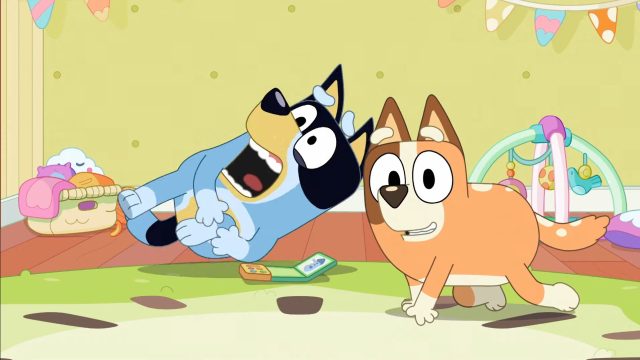I am not a Bluey obsessive. When I talk about the shows I’m catching up with, it doesn’t even make the list. I’ll happily watch it, but I don’t go out of my way to do so. And I put a lot of time into explaining to someone why other people might recommend it to people without kids as a show they’d enjoy, because I think some of my friends without kids might enjoy it. Yes, it’s a show intended for a preschool audience, but I don’t think the intended audience of a show is an insurmountable barrier to people enjoying it outside that demographic.
For one thing, Bluey quite clearly joins the ranks of shows aimed at preschoolers but aware that they will likely be watching the show with their parents and therefore interested in making sure both children and parents will be entertained. The interaction between the adults doesn’t always include the children. The jokes aren’t always aimed at the kids; while not adult in the “let’s joke about sex and drugs” sense, they can be adult in the “this includes thoughts kids won’t get” sense. Sesame Street was deliberately planned that way, too, and it’s thoroughly watchable whether you’re a child—or parent—or not.
But let’s move beyond that, because there are lots of shows with intended demographics. The Joy of Painting, for example, does rather assume that one will, you know, use it to learn how to paint. While some people do indeed do just that, the vast majority of its audience hasn’t picked up a brush since grade school. Or uses one to paint walls or similar. My problem with the current trend of Bob Ross merchandise is not that none of the people who buy it are even painting; it’s that the people who control his estate are getting rich on his memory without deserving it. That’s different.
My beloved Joan of Arcadia was canceled because they were hoping to draw an audience of teenage girls, and its actual audience of middle-aged women wasn’t what they were hoping to advertise to. There is a lot of media that assumes you’re a teenage boy or an older woman or learning to cook or something. Lots of people watch them despite not being the target audience, and we all know that and go on with our lives. Saying, “I can’t watch cooking shows because I don’t want to learn how to cook” limits you from a lot of good shows, and that’s why no one takes you seriously if you say that.
I knew someone in college who told me she wouldn’t read the children’s books I was reading for class until she had kids of her own, because she wasn’t a kid. Which I assume means she still hasn’t read them, because she to my knowledge still doesn’t have kids. I told her she was missing out and I couldn’t understand limiting myself that way. My children have mostly outgrown Elephant and Piggy and the Pigeon, and I still read those books for pleasure sometimes. They’re charming and fun and written so parents won’t feel their brains leaking out their ears when they read them for the eight billionth time. Why is it surprising I’d suggest friends read them whether they have kids or not?
Help me afford The Pigeon Will Ride the Roller Coaster by supporting my Patreon or Ko-fi!


